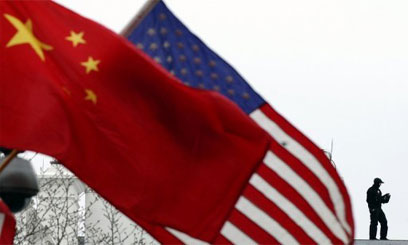 BEIJING, Feb 7 – China’s hardline political stance, as shown by its veto of a UN resolution on Syria at the weekend, is increasingly clashing with the Asian powerhouse’s efforts to improve its image abroad, analysts say.
BEIJING, Feb 7 – China’s hardline political stance, as shown by its veto of a UN resolution on Syria at the weekend, is increasingly clashing with the Asian powerhouse’s efforts to improve its image abroad, analysts say.
Beijing and Moscow both came under a barrage of criticism for blocking the UN resolution condemning Damascus for its brutal crackdown on protests, with Washington calling their rejection a “travesty”.
Many saw the veto as a sign of Beijing’s growing confidence in international affairs and a taste of things to come as China rapidly expands its global reach and becomes increasingly powerful.
But analysts said the veto was part of China’s long-standing policy of non-interference in other nations’ internal affairs.
“Beijing runs into repeated problems when national policy collides with improving China’s image,” said Jonathan Fenby, head of the China team at research group Trusted Sources.
“That was the case with the jailing of the Nobel Peace prize winner (Liu Xiaobo) and now with the veto over Syria. China puts its national policy first including defence of ‘core interests’ and pays a price on the soft power side.”
The fact that the UN vote came just hours after Syrian troops were accused of killing hundreds of civilians only exacerbated the international uproar.
China has a unenviable reputation as an authoritarian state that represses freedom of expression and does not tolerate dissent.
Crackdowns on pro-democracy movements, and efforts to stamp out opposition movements in Tibetan and mostly-Muslim Uighur areas have only cemented the view.
But conscious of this reputation, the one-party regime has poured billions of dollars into trying to improve its image abroad.
In 2009, Beijing announced a huge expansion of its state-run television CCTV, radio CRI and news agency Xinhua abroad, with the latter renting a huge billboard on New York’s Time Square.
It has also expanded its Confucius Institutes — designed to promote Chinese language and culture — with more than 640 outlets now scattered around the globe, including 350 in the United States alone.
Beijing’s aid abroad rose by nearly 30 percent every year between 2004 and 2009, according to state media, and China builds infrastructure for poorer countries, such as the recent African Union headquarters in Ethiopia.
On the diplomatic front, it has scored points by participating in UN peacekeeping missions or anti-piracy efforts off the coast of Somalia, and by chairing mechanisms such as talks aimed at ending North Korea’s nuclear drive.
“Beijing is pretty successful in promoting a positive image of China to foreign audiences, especially in the non-Western world. People are impressed by its economic success and social stability,” said William Callahan, politics professor at the University of Manchester.
“In the West, however, I don’t think that Beijing has been so successful.”
Communist Party leaders recently acknowledged this, and earlier this year, President Hu Jintao urged more efforts to increase the nation’s cultural influence overseas.
But China’s alliances with regimes that are out-of-favour with Western countries — such as Sudan, North Korea, Iran and Zimbabwe — do not help in the eyes of many global players.
“CCP (Chinese Communist Party) ruling groups know that many people in the democracies imagine Chinese foreign policy as one of choosing to support cruel pariah regimes,” said Edward Friedman, politics professor at the University of Wisconsin-Madison.
“CCP leaders instead see China as a late-comer to the world market and therefore being forced to go to places which the OECD nations (such as the United States, Britain and France) do not dominate,” he said.
This “often means governments suffering from OECD sanctions or conditionalities, from Angola to North Korea”.
Shi Yinhong, professor of international relations at Beijing’s Renmin University, said China considered both its own and others’ interests when dealing with global issues.
“China has close contact with North Korea (for instance), but China has also twice voted in favour of sanctions against North Korea’s nuclear tests, because they threatened safety in Northeast Asia and international peace.”
But as China’s overseas interests have expanded — for instance due to its growing energy needs — it has increasingly become embroiled in complex political disputes, said Sarah McDowall, senior analyst at IHS Global Insight.
“The policy of non-interference has increasingly been put to the test in the last few years,” she said, pointing for example to Sudan, where China was quick to recognise South Sudan as an independent state last year.
Willy Lam, an expert in Chinese politics at the Chinese University of Hong Kong, said Beijing risked becoming ostracised, particularly after events in the Middle East where some once-authoritarian nations are moving towards democracy.
“If — as is likely — new ideas and global values spread in the Middle East and Africa, then China will find itself in a more and more difficult situation,” he said.
“Even from China’s point of view, the decision on Syria was a mistake, because I think eventually it will hurt China’s position amongst people in the Middle East.”














































